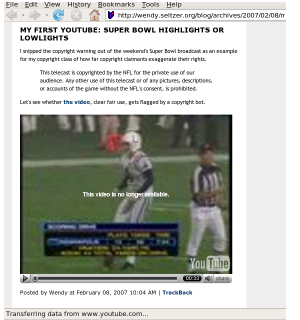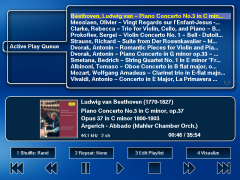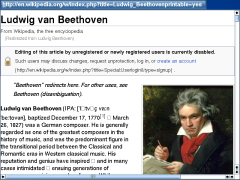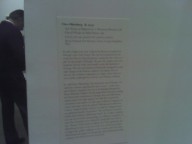What do anthropologists, teachers, cultural leaders, digital artists, technologists, and lawyers do when they get together? Well, a group of us convened in Maine earlier this winter to talk about cultural sharing: As western corporations seek out the traditional knowledge of farmers and healers in the developing world, or artists seek ways to share their art with corporate audiences, could we develop frameworks in which those from different cultural backgrounds could share knowledge on equal footing?
A few intense days of discussion developed a Cross-Cultural Partnership framework, using the legal infrastructure of a partnership agreement to enable the parties to describe their joint and separate goals in a common project. The framework provides a bare template, to which those working together must add descriptions of their aims and intentions. It's our hope that the entanglement of the partnership form, requiring greater personal involvement than an arms'-length contract or license, will help parties to bridge different values and backgrounds.
We're still in early draft and I welcome readers' thoughts and comments. Excerpts from the template's preamble follow the "More" link.

From the Cross-Cultural Partnership Draft:
In many contexts people look to the law to establish or enforce a 'safe space' in which collaborative relationships may flourish. Good intention is more fundamental to establishing and sustaining relationships than law or codes of conduct. Nonetheless legal agreements and faith in the law often facilitate relationships where trust is not yet established.
Here we offer a template: the result of long-term consideration of issues around collaboration in many contexts. The template draws specifically, and intentionally, upon understandings abstracted from both established social practices and licenses developed for digital creations. Experience points to the significance of considering and accommodating the expectations, interests, and location of parties to a collaboration.
Copyleft has built its alternative upon the scaffolding of copyright law to achieve goals outside of that law's usual bounds. For the exchange of knowledge and creative partnerships (including between indigenous peoples, corporations and institutions, different disciplinary actors, etc.) we draw upon frameworks from the area of the law pertaining to partnership.
Under the Digital Millennium Copyright Act's safe harbor provisions, Internet service providers are immunized from monetary liability for users' copyright infringements if the ISPs follow notice-and-takedown procedures set out in Section 512. 512 also includes a counter-notification-and-putback procedure, 512(g), by which ISPs are encouraged* to replace material if they get a counter-notification asserting "good faith belief that the material was removed or disabled as a result of mistake or misidentification of the material to be removed or disabled."
So, having received a mistaken DMCA notification, I sent my counter-notification to YouTube, generated with the Chilling Effects counter-notice generator. 512(g) instructs the ISP to replace the material in 10-14 business days. Check back in March to see if YouTube reposts those Super Bowl copyright warnings.
---
*The encouragement? They're immunized from suit by their users if they put back. Alert readers of TOSs will notice, however, that the ISPs terms of service usually provide this immunity already, even if the ISP dumps a user for no reason at all. 512(g) doesn't have much bite.
That didn't take long. On Feb. 8, I posted to YouTube a clip taken from the Super Bowl: not the football, but the copyright warning the NFL stuck into the middle of it, wherein they tell you it's forbidden even to share "accounts of the game" without the NFL's consent.
Their copyright bot didn't seem to see the fair use in my educational excerpt, so YouTube just sent me their boilerplate takedown. Time to break out that DMCA counter-notification.
-------- Original Message -------- Subject: Video Removed: Copyright Infringement Date: Tue, 13 Feb 2007 15:43:24 -0800 (PST) From: DMCA Complaints To: peppercornconsider Dear Member: This is to notify you that we have removed or disabled access to the following material as a result of a third-party notification by National Football League claiming that this material is infringing: Super Bowl Highlights: (http://www.youtube.com/watch?v=a4uC2H10uIo) Please Note: Repeat incidents of copyright infringement will result in the deletion of your account and all videos uploaded to that account. In order to avoid future strikes against your account, please delete any videos to which you do not own the rights, and refrain from uploading additional videos that infringe on the copyrights of others. For more information about YouTube's copyright policy, please read the "Copyright Tips" guide: http://www.youtube.com/t/howto_copyright. If you elect to send us a counter notice, to be effective it must be a written communication provided to our designated agent that includes substantially the following (please consult your legal counsel or see 17 U.S.C. Section 512(g)(3) to confirm these requirements): (A) A physical or electronic signature of the subscriber. (B) Identification of the material that has been removed or to which access has been disabled and the location at which the material appeared before it was removed or access to it was disabled. (C) A statement under penalty of perjury that the subscriber has a good faith belief that the material was removed or disabled as a result of mistake or misidentification of the material to be removed or disabled. (D) The subscriber's name, address, and telephone number, and a statement that the subscriber consents to the jurisdiction of Federal District Court for the judicial district in which the address is located, or if the subscriber's address is outside of the United States, for any judicial district in which the service provider may be found, and that the subscriber will accept service of process from the person who provided notification under subsection (c)(1)(C) or an agent of such person. Such written notice should be sent to our designated agent as follows: DMCA Complaints YouTube, Inc. 1000 Cherry Ave. Second Floor San Bruno, CA 94066 Email: copyright@youtube.com Please note that under Section 512(f) of the Copyright Act, any person who knowingly materially misrepresents that material or activity was removed or disabled by mistake or misidentification may be subject to liability. Sincerely, YouTube, Inc.Update: Here's the NFL's demand (not very informative).

 You can do great things with free content, and great things with free code, but combining the two multiplies their effect. So I found when I wanted to enhance my Free Software music system with more information about the compositions it played.
You can do great things with free content, and great things with free code, but combining the two multiplies their effect. So I found when I wanted to enhance my Free Software music system with more information about the compositions it played.
Wikipedia is by now among the canonical examples of what Yochai Benkler calls "peer production" of information. Working outside the traditional sphere of economic incentives, unpaid volunteers have built an encyclopedic database to rival Britannica, as a Nature study suggested. So I can learn a lot from Wikipedia, but I can learn about as much from Britannica if I have one, but where Wikipedia really shines is its access and the remix potential that comes from its generous license.
Popping up as the first result on a growing number of Google searches, Wikipedia brings knowledge closer than Britannica can. That one-click access also feeds a set of virtual network effects, if even a few of the people who read an entry from that search then go on to edit it or another article. The encyclopedia grows as its crowds seek more information.
Wikipedia's liberal terms of use further enhance its value, because I'm not limited to browsing it from my desktop web browser: I can select a subset of documents to load on a Treo or preinstall on the $100 laptop from OLPC. Finally, add free software to the equation and you open up the true generative possibilities, in Jonathan Zittrain's terms.
 So back to that music system. A friend, listening with me the other day as MythTV played music, asked whether the system could show more than the standard artist-album-track and album art on-screen. Not yet, but why not? MythTV is open source, Wikipedia is open information, and has surprising depth in classical composers. A few hours of coding later (and preliminary patches shared with the MythTV community), my music library now knows the dates of all its composers, and can bring up a composer's Wikipedia entry with a key-press while the music plays. Now, if I want to know who was writing music when the U.S. founders convened their Constitutional Convention, I need only ask MythTV (Mozart's Piano Concerto No. 26, for example).
So back to that music system. A friend, listening with me the other day as MythTV played music, asked whether the system could show more than the standard artist-album-track and album art on-screen. Not yet, but why not? MythTV is open source, Wikipedia is open information, and has surprising depth in classical composers. A few hours of coding later (and preliminary patches shared with the MythTV community), my music library now knows the dates of all its composers, and can bring up a composer's Wikipedia entry with a key-press while the music plays. Now, if I want to know who was writing music when the U.S. founders convened their Constitutional Convention, I need only ask MythTV (Mozart's Piano Concerto No. 26, for example).
It goes without saying that I can't go anywhere without seeing copyright issues lurking in the background. The last room of the Whitney's "Picasso and American Art," however, forced them to the foreground.
Throughout the exhibit, which showed Picasso artworks alongside American artworks they had inspired, were wonderful examples of transformative use -- artists from Max Weber to Jasper Johns taking elements from Picasso's work to create new art. Derivative works they might have been, but no one sued and the world is richer for them.
 In the final room, though, there appeared a litigation exhibit: Claes Oldenburg's "Soft Version of Maquette for a Monument Donated to Chicago by Pablo Picasso, 1968" was apparently created to help a declaratory judgment plaintiff defeat the City of Chicago's claim to copyright in the Picasso sculpture, which Picasso had dedicated to the Chicago public. I hope I can find so eminent an exhibit-creator if ever I need one.
In the final room, though, there appeared a litigation exhibit: Claes Oldenburg's "Soft Version of Maquette for a Monument Donated to Chicago by Pablo Picasso, 1968" was apparently created to help a declaratory judgment plaintiff defeat the City of Chicago's claim to copyright in the Picasso sculpture, which Picasso had dedicated to the Chicago public. I hope I can find so eminent an exhibit-creator if ever I need one.
 A storekeeper wanted to use a photograph of the Picasso to help customers find his store, and a publisher wanted to market copies of the sculptre. The Public Building Commission of Chicago objected. The court found no permission was needed because the work was in the public domain. Under the 1909 Copyright Act, the City's publication without proper notice of copyright divested it of any claim to copyright (if even Picasso's dedication could have been read to give it to the Commission in the first place). Unfortunately for future Oldenburgs and publics, revisions to the Copyright Act have done away with the requirement of formal notice of copyright, cutting off that avenue for works to enter the public domain.
A storekeeper wanted to use a photograph of the Picasso to help customers find his store, and a publisher wanted to market copies of the sculptre. The Public Building Commission of Chicago objected. The court found no permission was needed because the work was in the public domain. Under the 1909 Copyright Act, the City's publication without proper notice of copyright divested it of any claim to copyright (if even Picasso's dedication could have been read to give it to the Commission in the first place). Unfortunately for future Oldenburgs and publics, revisions to the Copyright Act have done away with the requirement of formal notice of copyright, cutting off that avenue for works to enter the public domain.
 Of course there's a coda to this story: As I was reading the museum label's account of this story, I thought I'd snap a Treo picture of the label as aide memoire -- only to hear a museum guard say, without irony, "no photography." Hence the blurriness of this image.
Of course there's a coda to this story: As I was reading the museum label's account of this story, I thought I'd snap a Treo picture of the label as aide memoire -- only to hear a museum guard say, without irony, "no photography." Hence the blurriness of this image.
I snipped the copyright warning out of the weekend's Super Bowl broadcast as an example for my copyright class of how far copyright claimants exaggerate their rights.
This telecast is copyrighted by the NFL for the private use of our audience. Any other use of this telecast or of any pictures, descriptions, or accounts of the game without the NFL's consent, is prohibited.
Let's see whether the video, clear fair use, gets flagged by a copyright bot.
Update: My First DMCA Takedown, a mere 5 days later.
Back in December, both the motherboard and the hard drive on my Thinkpad X41 Tablet died. Happily, Lenovo's warranty service was superior, getting the machine back to me fixed three days after I shipped it out broken. Due to the timing of the hard drive failure, however, I found myself with a blank hard drive and no USB CD-ROM drive from which to re-load Windows.
From problem springs opportunity: I'd wanted to install GNU/Linux on this machine, and now I didn't have to deal with re-partitioning! If I needed to move back to Windows later, I'd be no worse off. So I set up a network install from an Ubuntu disk I had around, and within the hour I was setting up applications and copying data back.
A month in, I haven't regretted the switch nor pined for Vista. With the help of ThinkWiki, the machine sleeps, wakes, and works better than ever, even rotating the screen automatically in tablet mode. Firefox looks the same on any platform; OpenOffice.org has been a drop-in replacement for Microsoft Office, allowing seamless exchange with colleagues' .doc and .ppt files and making it easy to generate PDFs, as a bonus; Thunderbird handles and filters email almost as well as Eudora; Wine runs the odd but necessary Windows app; and the command line and development environment underneath it all offer customization possibilities much harder to achieve in Windows. Ubuntu's focus on combining power with ease of use has really paid off.